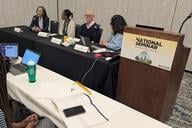You have /5 articles left.
Sign up for a free account or log in.
The advertisement for the assistant professor of English job at the Asian University for Women included typical information about the position, academic requirements, and deadlines. Because the university was located in Chittagong, Bangladesh, as I read the ad I translated it into something like the following: "Intrepid world traveler desired to teach in off-the-beaten-track location. Successful candidate will have research agenda focused on Asia, with at least five years' experience living in the region. Preference given to adventurers, free spirits, and nonconformists." I could almost see the asterisk with the words in tiny print: "not you."
By the criteria I had imagined in my mind, I failed on every count. I had spent most of my life, including my graduate school years, in the American Midwest. Not only had I never been to Asia, but most of my international travel had been in Europe. My research centers on British literature. While I venture into the writings of 19th-century missionaries, most of my work focuses on literature by British authors and about British characters and contexts. Perhaps most important, I struck myself as a bit too staid and structured to live and work in a developing country like Bangladesh. My lesson plans, which are detailed documents that are sometimes several pages long, testify that I am not exactly a free spirit.
Although I found the position intriguing and applied for it anyway, I did not expect my application to draw any attention. While I believed I was a good match for the university in terms of my teaching, academic interests, and support for the university’s mission, I was sure I would be disregarded — understandably, in my opinion — for being the wrong kind of person. The university surprised me by offering me the job, however, and I surprised myself by accepting it. When I moved to Bangladesh and met my colleagues, I realized that I had created a vision of an international university’s "ideal candidate" that was far too limiting, and at times, completely off-base.
To begin, I had assumed that the university would want candidates whose research centers on Asia. Underneath that assumption was a fragment of truth: my university, because of its unique mission and distinct student body, does particularly look for candidates who connect well to the university and the region. In some cases, these faculty members do fit the university in the ways I had imagined: I have several colleagues who have lived, worked, and researched in Asia for many years, making them experts in the region and wonderful resources for the rest of us.
I have come to see, however, that I was mistaken in equating "connection" to the region with "specialization." Some faculty members — who are no less valuable — have been drawn here for non-academic reasons, having personal, family, or cultural connections to Asia that gives them familiarity with and passion for its unique context and challenges. Others, like myself, have even less apparent, but no-less-real associations. In my case, my dissertation explored portrayals of rote learning and female identity. These two topics play crucial roles in my current job, because my students come from rote learning backgrounds and are forging identities as female leaders in a region that frequently fails to recognize them in those roles. In imagining "fit" with an international university, it's worth thinking broadly instead of focusing too narrowly on background or specialization.
I had been equally narrow-minded in my belief that a successful candidate would have a personality marked by an extreme ability to go with the flow on the one hand, and a propensity for adventure and risk-taking on the other. While actually working here has convinced me more than ever that having a certain personality is crucial for success, it is not marked by these qualities. Instead of taking a laissez-faire approach to their jobs or boldly blazing new academic trails, my colleagues combine professionalism with flexibility, creativity, and resourcefulness as they aim to excel — in spite of the challenges of a developing world.
Notice a few cases in point. The science faculty has spent hours designing back-up lab activities while they have waited for the laboratories to be outfitted with imported microscopes and other high-quality equipment. Colleagues from a variety of fields have scrambled to develop course packets or adjust their syllabuses when textbooks were delayed in shipping. All semester long, faculty teaching writing-intensive seminars have made themselves available for hours of writing conferences for their all-ESL student body. Faculty make other day-to-day adjustments, too, such as planning technology around frequent power outages or adjusting class schedules as a result of nationwide strikes (which have occurred twice during the writing of this article).
When facing situations like these, one approach would be to shrug, toss out the lesson plans, and contentedly drink yet another cup of tea. While a person who naturally responds that calmly would not be flustered by teaching here, such adaptability could easily lead to losing class content in the process. Our students, however, are seeking a high-quality, internationally recognized education. As a result, my colleagues take a different approach: of being deeply committed to their teaching to the point that they invest extra time and energy into planning their lessons, meeting with students, and creating contingency plans in the face of unforeseen events. Although we have different personalities and approaches to teaching, a bit of structure tends to be an asset here rather than a sign of a bad fit.
Similarly, while living and working in Bangladesh is not exactly a mainstream decision, my university is not populated with the "adventurers, free spirits, and nonconformists" that I had imagined thriving here. While even a trip to the grocery store can sometimes be counted as a legitimate adventure, most days our lives are filled with teaching, service, and research rather than exciting exploits. In addition, the nature of our institution — which is a small start-up university in a developing country with an international faculty and student body — means that we face challenges particular to our context and have to work intimately together to tackle them. We benefit from people who have positive attitudes, work well in teams, and are open to new and creative ways of doing things. In simplified terms, we're looking less for “runs with scissors” and more for “plays well with others.”
In approaching job ads, it’s not always a bad idea to read between the lines: frequently universities are looking not only for certain specialties, but also for certain kinds of people. When approaching international jobs, however, it can be easy to make inaccurate assumptions and thereby eliminate yourself. If I were to rewrite my imagined job ad, with the wisdom and experience accumulated over only a few short months in Bangladesh, I would restate it in the following way: "Dedicated and creative teacher desired to teach diverse student body in developing country. Successful candidate will connect to the university or region, but that connection may be broadly defined. No experience in Asia required. Preference given to team players, hard workers, and optimists." Just maybe that person is you.




